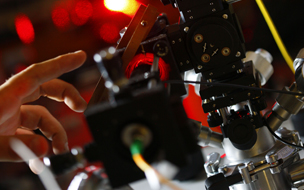ICSO2013 - Toulouse
mardi 26 février 2013

26 février 2013, 12h36
The ICSO conference is the final event of the Marie-Curie ITN SPIN-OPTRONICS European network. The SPIN-OPTRONICS Network is an international consortium of ten leading research institutions dedicated to the optical exploration of spin and exciton-polariton condensate physics in semiconductor nanostructures.
Topics covered by the conference :
Spin-optronics is an interdisciplinary field emerging at the cross roads of fundamental physics of spin-related phenomena in condensed matter, photonics and quantum optoelectronics. Quantum confinement of a particle along one or several dimensions modifies drastically the spin dependent phenomena. The objective here is to use these quantum confined spin states in semiconductor nanostructures for storage and manipulation of quantum information, and the polarised photons as vectors of communication and control of individual spins or spin ensemble. The spin systems considered here, directly or indirectly controlled by light, are of two kinds : First those implying a small number of electrons, holes, magnetic impurities, individual or ensembles of nuclear spins localized in various nanostructures made of III-V or II-VI semiconductors eventually embedded in photonic structures, as well as diluted magnetic semiconductors and hybrid structures designed with magnetic and non-magnetic materials. A second aspect will be devoted to polariton pseudo-spin in relation with polariton condensates confined in planar micro-cavities, or in various photonic structures. The aim of this conference is to disseminate knowledge and show present trends in the field of spin control and manipulation by currents or light of spin systems, spanning from microscopic to macroscopic ones. The principal points addressed in this conference will concern more specifically the following topics :
* Coherence of individual spins (electrons, hole, magnetic ion), spin quantum bit memories * Properties of interacting electron-nuclei spin systems * Polarisation entangled or single photon sources based on semiconductor quantum dots (in particular exciton fine structure control by magnetic, electric or strain field, Bragg reflector cavities vs. plasmonic structures…). * Interaction between free and localized spin states in diluted magnetic semiconductors and hybrid structures. Light induced ferromagnetism in quantum dots containing a small number of magnetic ions. * Spin-optronic devices based on microcavity exciton polaritons (multi-stability effects, electrical polariton injection, room temperature micro-polaritonic parametric oscillator…) * Physical properties of exciton-polariton condensates (Optical spin-Hall effect, superfluidity, solitons effects, vortex dynamics, optical traps, transport of polariton Bose condensate…)
Progress in different investigation techniques in nanostructures will be also presented such as c.w. or time resolved magneto-micro-photoluminescence spectroscopy, magneto-optical Kerr/Faraday effect, optical coherent control, cw/pulsed radiofrequency excitation, or correlation techniques performed on single nano-crystals…), as well as breakthroughs in device elaboration by nanotechnologies in relation with spin-optronics (e.g. new structures for polariton condensates, QD-photon sources…).
The Spin-Optronics ITN network consists of ten leading international institutions at the cutting edge of researches on spin manipulations and optics of semiconductor nanostructures such as, for instance, the recent work led by the Institut Blaise Pascal, PHOTON-N2, (University of Clermont Ferrand, France) together with the Kastler -Brossel Laboratory (Pierre et Marie Curie University, ENS Paris, France) on half-solitons in exciton-polariton condensates and their behaviour in terms of one-dimensional magnetic monopoles, or the work led by Toshiba Research Europe on sources of polarisation entangled photon pairs emitted by single semiconductor quantum dots. Read more information about the location of the conference.
